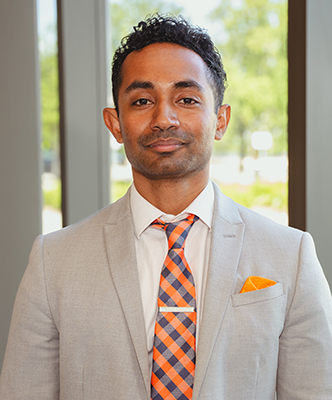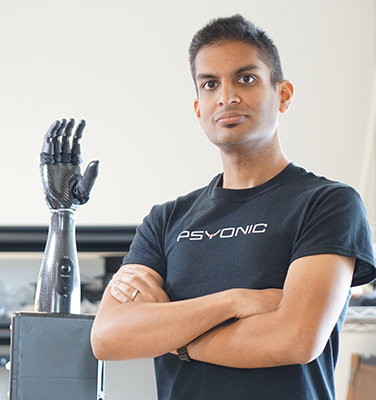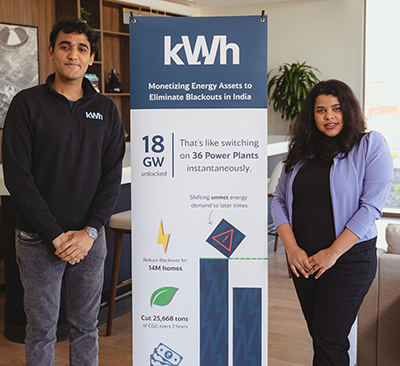
Aug 11, 2025 Accountancy Alumni Business Administration Entrepreneurship Faculty Finance Student
Chicago component highlights iVenture Accelerator Cohort 11
For 10 years, the iVenture Accelerator at Gies College of Business has helped jumpstart University of Illinois-based companies. The 10-week accelerator, housed in the Origin Ventures Office of Entrepreneurship, provides students with education, financial resources, and a network of connections to build and scale their ventures. This year, for the first time, much of that accelerator took place at TechNexus in the heart of Chicago’s South Loop.
Being integrated into the city’s budding entrepreneurial ecosystem and having easy access to alumni in a multitude of fields has made the cohort an absolute success.
The 44 students and 12 teams began the accelerator at the Siebel Center for Design on the Illinois campus in mid-May, then transitioned to TechNexus for the month of June.
“iVenture has given us access to some successful entrepreneurs who help us brainstorm daily, making sure we are on the right track and working as hard as possible to make this happen,” said Arham Shah, founder of kWh, which is integrating and monetizing energy assets for India to eliminate blackouts.
“iVenture has put us in contact with incredibly talented people with vast networks,” added Xavier Chick, co-founder of Second Chance Innovations, which is creating upper limb orthosis devices to improve mobility of stroke patients. “Learning from their expertise has been invaluable.”
A major part of a sophisticated ecosystem

Manu Edakara is beginning his ninth year as director of the iVenture Accelerator. He notes that in the “walking” stage of the program, the goal was to build something sustainable. As iVenture built on its success and began to “run”, it became a pillar in the entrepreneurial ecosystem on campus.
Each year, a committee of cross-campus directors from Gies College of Business, the Grainger College of Engineering, the Technology Entrepreneurship Center, Research Park, and Illinois Ventures (the University’s public-private venture capital arm) selects campus teams based on their potential to represent the University of Illinois.
“We take mature teams,” Edakara said. “They need to have a great team that is not only technically capable but also coachable. We want to work with people who are ambitious and passionate, but who are also thinking about their ‘why.’ The brand promise of Gies is ‘Business on Purpose’, so the first question we ask iVenture Founders is ‘Why do you do what you do?’”
Although a lot has changed during Edakara’s time at the helm, the foundation is still the same. What sets iVenture apart from other accelerators is that it doesn’t take a single piece of the pie, meaning startups come away owning 100 percent of their venture.
“Our first principle is student learning and development,” Edakara said. “Venture development is great. Our companies have raised over $160 million with a total value of nearly $1 billion over the years. However, our teams are succeeding afterwards, both personally and professionally, because we're first and foremost creating a place where young people can truly dream big and build big.”
Following the 10-week accelerator, team members participate in a curricular component, which is the iVenture Seminar.
“Those courses have been rated as some of the best at the university level,” Edakara noted. “They focus on the reality of being a founder, like giving good updates, doing mock board meetings, and bringing in founders to talk about their experiences.”
After that, the founders can interact with the rest of the ecosystem. They can go through the Cozad New Venture Challenge. They can run their product through EntreCorps, a pro bono startup consulting team. About 44 percent of the founders are women, and about a quarter come from underrepresented categories.
“A key component is that we are really inclusive,” Edakara said. “Having access and improving access to different kinds of founders, such as women and people of color, changes the nature of people on campus who think they can be founders.”
The University of Illinois has intentionally offered several avenues for these student startups to build their teams, including through classes, registered student organizations (RSOs), and an event called Social Fuse, where innovators, budding entrepreneurs, marketers, designers, etc., come together to find the team members they need to succeed.
“We met freshman year and participated in Cozad two years ago,” said Ayush Sharma, co-founder of Klink!. “A suggestion by a Cozad judge sparked us to pivot from our initial idea.”
“We are a very engineering-focused team,” said Peter Chen, founder of CreatoRain. “I am very grateful to the University of Illinois for providing such a wonderful ecosystem for engineers like us.”
“I think what the U of I provides within the ecosystems is a community of friends,” added Sofia Marin, team lead at InvoGenix. “In entrepreneurship, there are a lot of lows, and I think it’s important and refreshing to have people who have this massive dream that can support each other.”
iVenture success stories
In 10 years, iVenture has had its share of success stories.

PSYONIC (cohort 1) is building a bionic arm that can sense touch. Its founder, Aadeel Akhtar, was inspired by a veteran of the war in Iraq, who lost his arm to an IED blast and had a dream of an arm that could sense his daughter’s touch. The team has appeared on Shark Tank and produces about 1,000 arms each year. The arms are FDA-approved and are covered by most insurance plans.
Trala (cohort 3) created an app that teaches people how to play the violin. They have a Grammy-winning musician on their team and raised $22 million from the CEOs of LinkedIn, Duolingo, and Reddit.
Swa Taleem (cohort 5) finds girls from rural India, who otherwise would be married off, and puts them into special schools to help train them for the workforce. The non-profit raised $2.5 million from Google and is supported by the Indian government.
Individual students themselves have done amazing things after going through iVenture. Amaury Saulsberry, who came to the U of I College of Fine and Applied Arts from the South Side of Chicago, created pacifiers for babies with acid reflux and was later chosen to introduce President Barack Obama when he came to campus.
These successful startups help form the pillar of a vast iVenture fraternity.
“One of the most powerful things is the network that exists within iVenture,” Marin said. “The people who have come through this program have created change in the world already. Being able to have access to those people without having to go through the pain of LinkedIn cold messaging has been drastically impactful for us.”
Gies is enhancing its entrepreneurial identity.
Gies Business doubled down on its commitment to entrepreneurship in 2025. For starters, it brought its operation under one umbrella, the Origin Ventures Office of Entrepreneurship, and appointed Melissa Graebner as the Associate Dean of Entrepreneurship. Secondly, it co-sponsored the Cozad New Venture Challenge, which resulted in an increase of Gies-led teams from seven in 2024 to more than 50 in 2025.
Even though iVenture is housed in Gies, it is open to the entire University system, supporting non-profits, social culture projects, and the traditional, backable startups.
“We have found that magical things happen when you put smart people from different backgrounds together under one roof,” Edakara said. “That is why being multidisciplinary and being open and inclusive is super important to us. Gies is a good haven to bring these people together, to steward them, and provide them with the environment and the resources to go out and impact the world.”
“At Gies College of Business, the opportunities are endless,” said NoshBox’s Adarsh Jaju, who is pursuing a master’s in technology management, participated in the Cozad New Venture Challenge, and was a convocation speaker. “iVenture is the perfect cherry on top.”
In addition to iVenture, HAWA founder Ezldean Shalabi has been involved with Build Illinois and the Muslim Tech Collaborative.
Cohort 11 Snapshots
CreatoRain is creating an AI marketing tool that automates micro-influencer marketing and processes for clients around the globe.
“We found clients who gave us some very specific guidance that helped to design a customized feature for their platform,” Chen explained. “Step by step, we onboarded a couple of more clients and started building our product according to each one’s specific demand. We now have a well-rounded product with multiple features that could be applied to multiple industries.”
Credence Cleantech Solutions provides green steam, electricity, and hydrogen solutions so that industries can limit their carbon footprint and cut operation feedstock costs with innovative AI-integrated concentrated solar power.
“We are using iVenture to connect with industry leaders and find potential clients,” said team member Zuyu Liu. “We are going to open pre-seeding almost immediately after iVenture.”
Credence built an approximately 15-kilowatt system as a prototype and is working with DGM, the largest energy provider in India.
Led by Shalabi, HAWA is developing a clothing design brand to reignite the Muslim and Eastern creative spirit.
Shalabi says he has been working on clothing and design since he got his first mobile phone in sixth grade.
“I have evolved into telling my own story and my background as an Arab American and as a Muslim-American. I felt like our voices hadn’t been heard the way we wanted them to be heard, so I felt like there was a gap in the market, if you will.”
InvoGenix is building AI-powered healthcare solutions to improve waiting times in emergency rooms.

“After talking to several physicians, we found that one of the root causes for long delays is that doctors spend a lot of time addressing billing code issues, talking to insurance providers, and doing clinical note documentation, all things that are outdated and should be optimized by AI,” said team lead Sofia Marin.
kWh is building a prototype, working on software development, and preparing to pilot their solution to India’s frequent energy blackouts. They are beginning in one Indian state in hopes of expanding it to the rest of the states by the end of 2025.
“We were able to reiterate several times over in the first month and then grow on top of that,” said founder Arham Shah. “This is a highly technical subject, and we need all the help we can get. iVenture has helped us bring more people on board, advising us on our business model while also getting in touch with a lot of Indian resources to gain more on-ground insights.”
Klink! is designing a platform around the Happy Hour community. They are helping bars and restaurants turn those empty barstools into packed happy hours.
“We spent last summer building the product and doing customer interviews, and here we are at iVenture, close to launching,” Sharma said.
“We’ve been in Beta testing for a couple of months,” said fellow team member Sasha Ilijevski. “Our next steps are a big marketing push. When we launch, we don’t want to just launch; we want to create a community around these happy hours using our app.”
LaneTrax is bringing professional-level analytics to every bowler.
“Back in high school, I bowled competitively, and I noticed that the same teams bowled better in tournaments,” said founder Graham McKee. “It turns out that those were the teams that had access to a $15,000 tracking system. LaneTrax is a much more cost-effective solution where you need only your phone and a tripod to get the same data.”
Currently, the LaneTrax app is in Test Flight, Apple’s testing platform, where 750 people are testing it. Once the app is refined, the company plans to implement a revenue model and a subscription plan.
NoshBox is a surplus food marketplace empowering local businesses to fight food waste and hunger by allowing customers to purchase fresh meals at affordable prices.
“We feel that hunger and surplus food shouldn’t exist in the same neighborhood,” said Jaju. “We’re trying to solve that problem.”
Second Chance is a biotech startup that is creating powered upper limb orthosis devices for post-stroke patients to assist in increased range of motion, higher individual carrying capacity (as much as 10-15 extra pounds) using EMG sensors, and real-time muscle-controlled activation.
“We’re motivated by the idea of getting patients back to living fully post-emergency healthcare,” Chick said. “When we think about design and furthering the product, we need to remind ourselves that you must work very hard at rehab. Therefore, our goal is to make that product as easy as possible for them.”
The team is in the product development stage and is hoping to eventually expand its reach to the sports rehabilitation market.
Sound of Molecules is accelerating drug discovery using a patented musical encoding of molecules. The idea started when founder Emily Zhou watched a YouTube video called “The Sound of Pi,” which matched music and math together.
“I thought that was such an interesting idea, so I tried to find several different interdisciplinary connections,” she said. “That’s where I came up with the idea of connecting musical notes to molecules and different elements. It has kind of exploded from there.”
The team maps musical notes to elements in the periodic table, and those elements can make up different molecules. There is a lot of information you can encode (different log P values, different molecular weights, using different chords, and a lot of different processes). Many of the team members have played at Carnegie Hall, and one is a Grammy-nominated percussionist.
“My skills have lagged behind my ambitions,” Shalabi said. “iVenture came at the perfect time, where it has given me the tools and ability to execute. It’s given me a runway. Hopefully, I can fly now.”
“I feel like every workshop I have gone to, and every pitch competition has instilled the thought that you can just do things,” said Ilijevski. “If someone had an idea, I would honestly tell them the University of Illinois is the place to make it happen.”
